Le pouvoir de l'éducation : Un message inspirant de YOLO Vision 2024
Revoir le discours d'ouverture YOLO Vision 2024 d'Ousman Umar sur la transformation des difficultés en opportunités grâce à l'éducation numérique et aux solutions locales.

Revoir le discours d'ouverture YOLO Vision 2024 d'Ousman Umar sur la transformation des difficultés en opportunités grâce à l'éducation numérique et aux solutions locales.

Lors de l'événement hybride annuel d'Ultralytics, YOLO Vision 2024 (YV24), des innovateurs et des visionnaires de l'intelligence artificielle (IA) et de la vision par ordinateur se sont réunis pour se connecter et partager des idées. Au-delà de la technologie de pointe, YV24 a été une excellente plateforme pour des conversations significatives sur le leadership, la construction de la communauté et la façon dont la technologie peut faire une réelle différence dans la société. Ousman Umar, fondateur de Nasco Feeding Minds, une organisation dont l'objectif est de fournir des ressources éducatives et des technologies aux communautés mal desservies du Ghana, a été l'un des intervenants les plus inspirants.
Dans son exposé, "Une histoire qui a changé ma vie", Ousman a parlé de son incroyable parcours, d'un petit village du Ghana à l'Europe. Il a parlé des difficultés qu'il a endurées et de la résilience dont il a fait preuve pour transformer ces défis en opportunités. Tout au long de son exposé, il a souligné à quel point l'éducation a été un tournant pour lui : elle lui a donné de l'espoir et une voie à suivre.
Son histoire nous a rappelé avec force que, même face à d'immenses difficultés, l'éducation et l'accès aux opportunités peuvent changer des vies. Dans cet article, nous allons examiner de plus près le discours émouvant d'Ousman à YV24, les leçons qu'il a partagées et la manière dont la technologie et l'éducation numérique changent des vies.
Ousman Umar a commencé son exposé en racontant des histoires de son enfance à Fiaso, un petit village du Ghana. Il a expliqué que la vie au village était difficile. Sa mère était décédée en couches et les traditions culturelles blâmaient l'enfant dans de telles situations. Malgré cela, son père, un chaman, l'a soutenu, l'a protégé et lui a donné la chance de survivre.
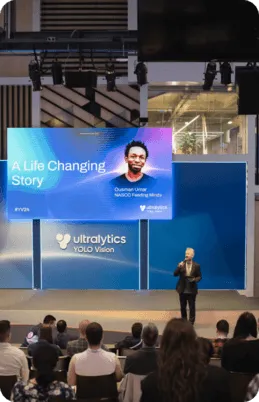
Ousman a ensuite expliqué que l'éducation n'était pas facilement accessible dans son village. L'école la plus proche se trouvait à des kilomètres et il devait marcher de longues distances chaque jour pour assister aux cours. Cependant, après seulement deux ans, il a été contraint d'arrêter pour aider à subvenir aux besoins de sa famille. À l'âge de 12 ans, il était toujours incapable de lire ou d'écrire, mais sa curiosité pour le monde restait forte.
À l'âge de neuf ans, il est sorti de son village pour la première fois, un moment qui lui a ouvert les yeux sur un monde au-delà de ses frontières. Il s'est rendu compte qu'il y avait tellement plus à découvrir. Sa curiosité s'est accrue lorsqu'il a vu un avion voler au-dessus de sa tête pour la première fois.
Il a raconté cet incident en disant : "Je ne comprenais pas comment cet oiseau de métal pouvait rester dans le ciel, mais ma voiture jouet ne pouvait même pas bouger toute seule."

Son imagination a été stimulée lorsqu'il a appris que des Blancs avaient construit de telles machines. Cette prise de conscience a alimenté son rêve d'atteindre l'Europe, un endroit qu'il imaginait comme un paradis.
Ousman a décrit comment ses voyages l'ont finalement conduit dans de plus grandes villes, dont Accra, où il a découvert pour la première fois l'activité trépidante d'un port. Il a mentionné que les navires, les camions et le mouvement constant lui ont ouvert les yeux. Les chauffeurs de camion qu'il a rencontrés au port parlaient de la Libye comme de la porte d'entrée de l'Europe. Inspiré par leurs histoires, il a commencé son voyage vers la Libye, espérant que cela le rapprocherait de son objectif.
Il a rejoint un groupe de migrants voyageant à travers le Niger et dans le désert du Sahara, conduits par des chauffeurs de camion. Ousman a raconté comment ces chauffeurs se sont révélés être des trafiquants qui ont abandonné le groupe après seulement trois jours. Ils se sont retrouvés avec un minimum d'eau et de nourriture dans l'un des environnements les plus hostiles du monde.
Il a décrit avec vivacité les difficultés de la marche pendant 19 jours dans le désert. La chaleur extrême et le manque de ressources ont coûté la vie à la plupart des membres du groupe. Sur les 46 personnes qui ont commencé le voyage, seules six, dont Ousman, ont survécu.
Après avoir survécu au voyage, Ousman a passé quatre ans en Libye, travaillant dans des conditions difficiles pour économiser de l'argent pour la prochaine étape de son parcours. Il a parlé ouvertement de la discrimination systémique à laquelle il a été confronté, décrivant comment, à l'époque, son identité et son origine lui donnaient l'impression d'être traité comme un esclave en Libye.
Malgré ces épreuves incessantes, la détermination d'Ousman à atteindre l'Europe et à se créer un avenir meilleur lui a permis d'aller de l'avant. Sa concentration inébranlable sur son rêve lui a permis de surmonter même les moments les plus difficiles.
Au cours de ses quatre années en Libye, Ousman avait économisé 1 800 dollars pour poursuivre son voyage vers l'Europe. Cependant, lorsqu'il est arrivé à Tripoli, il est retombé entre les mains de trafiquants d'êtres humains. Déterminé à atteindre ce qu'il imaginait être le paradis, il s'est lancé dans un dangereux voyage à travers la Tunisie, l'Algérie, le Maroc, le Sahara occidental et la Mauritanie avant d'affronter la dangereuse traversée de la Méditerranée.
La traversée a duré 48 longues heures dans un petit bateau surpeuplé, malmené par une mer agitée. Ousman est finalement arrivé sur l'île de Fuerteventura en Espagne, épuisé physiquement et émotionnellement. Le voyage a été dévastateur, surtout lorsqu'il se souvenait des centaines d'autres personnes qui s'étaient noyées en chemin. À son arrivée, il a été arrêté et a passé un mois et demi en prison avant d'être transféré à Malaga, où son voyage en Europe a finalement commencé.
À Malaga, les autorités lui ont demandé où il souhaitait vivre. Il se souvenait avoir entendu parler de l'équipe de football « Barça » et l'a mentionnée comme son choix. Cette décision l'a conduit à Barcelone, où sa vie en Espagne a commencé.
Ousman est arrivé à Barcelone en 2005. Il était seul dans une ville qui lui était totalement inconnue. Il ne parlait pas espagnol et ne savait ni lire ni écrire. Il n'avait pas non plus les moyens de subvenir à ses besoins. Pendant près d'un mois, il a vécu dans la rue, saluant les inconnus. La plupart des gens l'ignoraient, le laissant isolé et incertain quant à la prochaine étape.
Sa situation s'est améliorée lorsqu'une femme merveilleuse l'a remarqué. Elle lui a offert de la nourriture, un abri, de l'amour et des conseils. Son soutien lui a donné la stabilité dont il avait besoin à ses débuts à Barcelone. Ousman a décrit ce tournant dans sa vie comme une renaissance. Cela lui a permis de recommencer à se reconstruire et de prendre conscience du pouvoir de l'éducation.
Ousman a raconté comment il a eu accès à l'éducation pour la première fois de sa vie, décrivant cela comme une expérience qui a véritablement changé sa vie. Il a déclaré : « J'ai compris l'importance et le pouvoir de l'éducation. » Apprendre à lire et à écrire lui a ouvert de nouvelles perspectives, lui donnant la confiance nécessaire pour envisager un avenir meilleur et se fixer des objectifs plus ambitieux.
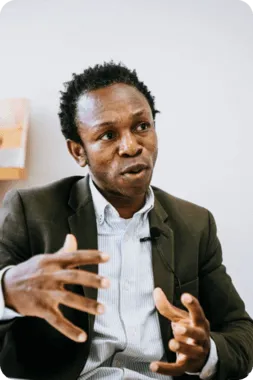
Il a raconté comment il avait réfléchi aux difficultés qu'il avait endurées et, au lieu de les considérer comme des échecs, il avait commencé à les considérer comme des leçons qui avaient façonné son objectif. Déterminé à apporter des changements, il a décidé d'utiliser ses expériences pour faire la différence. Il s'est concentré sur l'amélioration de l'accès à l'éducation pour les communautés défavorisées, afin de garantir que d'autres n'aient pas à faire face aux mêmes difficultés.
En 2012, il a fondé Nasco Feeding Minds pour s'attaquer aux causes profondes de la migration et créer des opportunités pour les jeunes dans les communautés défavorisées du Ghana. Nasco Feeding Minds se concentre sur la fourniture de connaissances plutôt que sur des solutions temporaires comme l'aide alimentaire. L'initiative donne aux étudiants l'accès à l'éducation et aux outils numériques, leur permettant de construire un avenir meilleur pour eux-mêmes et leurs communautés.
Nasco Feeding Minds fonctionne grâce aux contributions de la communauté et s'appuie sur des efforts locaux pour susciter un changement significatif. Le programme fournit aux jeunes les compétences dont ils ont besoin pour réussir sans quitter leur ville natale. La création d'opportunités locales réduit la nécessité d'entreprendre des voyages migratoires dangereux.
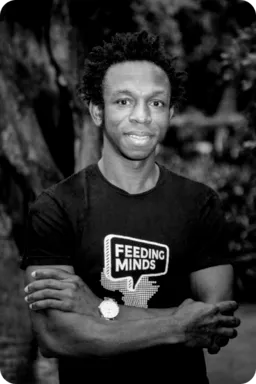
Nasco Feeding Minds a mis en place 17 laboratoires de technologies de l'information et de la communication (TIC) au Ghana, desservant plus de 50 écoles et bénéficiant à plus de 6 500 étudiants chaque année. Ces laboratoires offrent aux jeunes des compétences numériques essentielles, les préparant à de plus grandes opportunités et à un avenir meilleur.
Les enseignants bénéficient également de programmes de formation qui les aident à intégrer efficacement les outils numériques dans leurs classes, garantissant ainsi aux élèves de tirer le meilleur parti des ressources fournies.
Ousman Umar a ensuite lancé Nasco Tech après le succès de Nasco Feeding Minds. Il a franchi l'étape suivante en aidant les jeunes à transformer l'éducation en véritables opportunités d'emploi. Nasco Tech offre une formation en technologie et en entrepreneuriat. Elle permet aux étudiants de passer de l'apprentissage à la construction de carrières stables. Ousman a expliqué que Nasco Tech fournit aux participants des compétences en codage, en développement de logiciels et en support informatique. Ces compétences sont adaptées pour répondre aux exigences du marché du travail mondial.
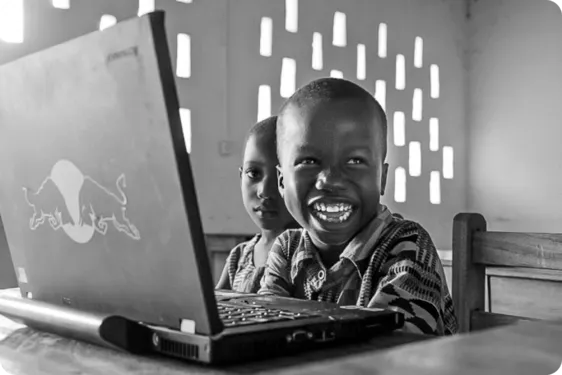
Nasco Tech propose des programmes axés sur le développement des compétences techniques. Ces programmes permettent aux diplômés de travailler pour des entreprises internationales tout en restant dans leur ville natale. Cette initiative a aidé plus de 30 professionnels à trouver un emploi dans le domaine de l'informatique. Nombre d'entre eux travaillent pour des entreprises en Espagne tout en vivant au Ghana.
Nasco Tech favorise un cycle où l'éducation mène à l'emploi, et l'emploi stimule le développement local. Ousman a conclu son exposé en partageant sa conviction qu'avec les bons outils et la bonne formation, les jeunes peuvent s'épanouir au sein de leurs communautés tout en contribuant à l'économie mondiale sans quitter leur pays d'origine.
Le pouvoir de l'éducation, surtout lorsqu'il est renforcé par l'IA, recèle un immense potentiel de transformation des communautés. La vision par ordinateur et les autres technologies d'intelligence artificielle aident les zones défavorisées à surmonter les défis et à accéder à de nouvelles opportunités. L'IA dans l'éducation permet des expériences d'apprentissage personnalisées qui répondent aux besoins individuels, rendant l'éducation plus efficace et accessible.
Par exemple, l'IA de vision peut transformer un simple smartphone ou une tablette en un outil pédagogique fiable. Grâce à la vision par ordinateur, ces appareils peuvent reconnaître des objets, traduire du texte ou même fournir des expériences de réalité augmentée (RA). Cela permet aux étudiants des régions éloignées de participer à des leçons interactives, par exemple en explorant des modèles 3D de structures biologiques ou en résolvant des problèmes de mathématiques avec des conseils visuels étape par étape.
Ces capacités apportent des ressources d'apprentissage avancées aux régions où les outils et installations traditionnels ne sont pas disponibles, comblant ainsi le fossé entre les défis locaux et les opportunités mondiales.
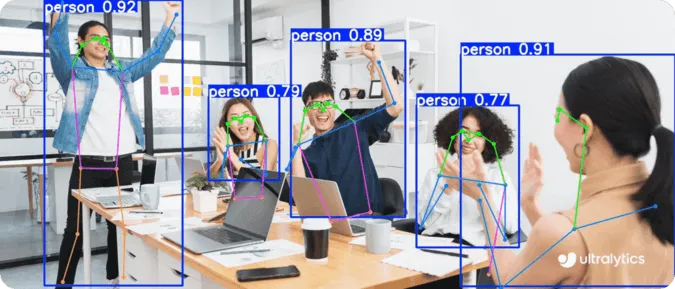
L'histoire d'Ousman Umar montre comment l'éducation, associée à la technologie, peut transformer des vies et des communautés. Grâce à Nasco Feeding Minds et Nasco Tech, il aide les jeunes à acquérir des compétences précieuses, à accéder à des opportunités mondiales et à contribuer à leurs économies locales sans quitter leur domicile.
En combinant l'éducation et la technologie, nous pouvons nous attaquer aux défis à la racine et créer de nouvelles opportunités de croissance et de développement. Le travail d'Ousman est un rappel inspirant de la façon dont l'éducation peut inspirer le changement et construire un avenir meilleur pour les communautés du monde entier.
Restez connecté avec notre communauté pour en savoir plus sur l'IA. Visitez notre dépôt GitHub pour découvrir l'impact de solutions innovantes telles que l'IA dans la fabrication et la vision par ordinateur dans le secteur de la santé.